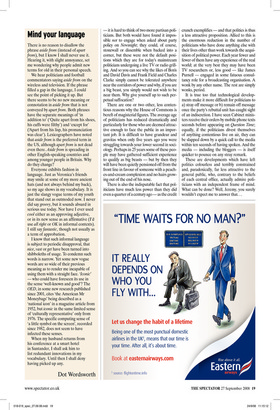Mind your language
There is no reason to disallow the phrase aside from (instead of apart from), but I know I shall never use it. Hearing it, with slight annoyance, set me wondering why people admit new terms for old in their personal speech.
We hear politicians and football commentators saying aside from on the wireless and television. If the phrase filled a gap in the language, I could see the point of picking it up. But there seems to be no new meaning or connotation in aside from that is not conveyed by apart from. Both phrases have the separate meanings of ‘in addition to’ (‘Quite apart from his shoes, his cuffs were filthy’) and ‘except for’ (‘Apart from his lisp, his pronunciation was clear’). Lexicographers have noted that aside from is the preferred term in the US, although apart from is not dead even there. Aside from is spreading in other English-speaking countries and among younger people in Britain. Why do they change?
Everyone exhibits fashion in language. Just as Veronica’s friends may smile at some of my more ancient hats (and not always behind my back), so my age shows in my vocabulary. It is just the slangy vogue terms of my youth that stand out as outmoded now. I never did say groovy, but it sounds absurd in serious use today. Nor have I ever used cool either as an approving adjective, or in its new sense as an affirmative (I’d use all right or OK in informal contexts). I still say fantastic, though not usually as a term of approbation.
I know that such informal language is subject to periodic disapproval, that nice, vast or get have been turned into shibboleths of usage. To condemn such words is narrow. Yet some new vogue words are so wide of their previous meaning as to render me incapable of using them with a straight face. ‘Iconic’ — who could have foreseen its use in the sense ‘well-known and good’? The OED, in some new research published since 2001, cites ‘the American Mr Moneybags’ being described as a ‘national icon’ in a magazine article from 1952, but iconic in the same limited sense of ‘culturally representative’ only from 1976. The specific computing sense of ‘a little symbol on the screen’, recorded since 1982, does not seem to have infected these senses.
When my husband returns from his conference at a smart hotel in Santander, I shall ask him to list redundant innovations in my vocabulary. Until then I shall deny having picked up any.










































































 Previous page
Previous page